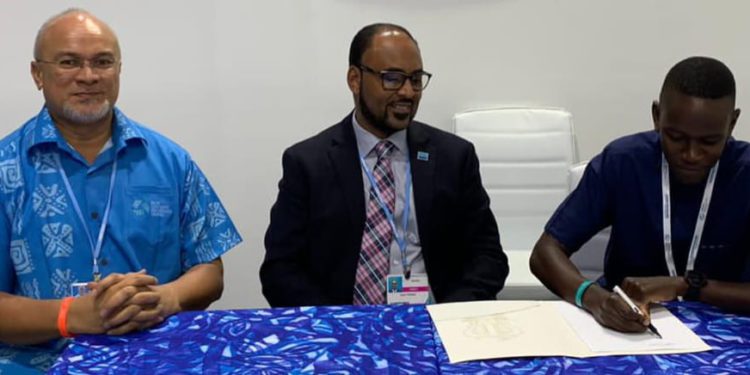Sharm el Sheikh, 21 November 2022 – Strengthening the reach and impact of the world’s risk pools is the key objective of a Memorandum of Understanding between African Risk Capacity Limited (ARC Ltd.), CCRIF SPC (formerly The Caribbean Catastrophe Risk Insurance Facility) and Pacific Catastrophe Risk Insurance Company (PCRIC) signed last week on the sidelines of COP27 in Sharm el Sheikh, Egypt.
The relevance and importance of the three global risk pools is clear especially in the face of the increasing frequency and intensity of climate change induced events. The MOU formalises and establishes a framework for enhanced cooperation and partnership among the three risk
pools.
Left to Right: Aholotu Palu, CEO, Pacific Catastrophe Risk Insurance Company; Isaac Anthony, CEO, CCRIF SPC; and Lesley Ndlovu, CEO, African Risk Capacity Limited signed an MOU this week on the sidelines of COP27 in Sharm el Sheikh, Egypt.
At the signing, Isaac Anthony, CCRIF CEO said: “This is an opportunity to take risk pools to the next level so that these are not just seen as insurance or mechanisms for transferring risk, but also are viewed as tools to scale up disaster risk finance in a very significant way to enable governments to provide higher levels of financial protection for their populations, including the most vulnerable.”
Anthony explains further that the MOU paves the way for the three risk pools to collaborate on sharing best practices in parametric insurance models, developing new and innovative DRF instruments and undertaking joint initiatives focused on advocacy, capacity building and training.
“One of the exciting things CCRIF is looking forward to is facilitating access to other types of DRF instruments. It will be important for example for the various risk pools to work collaboratively in engaging Global Shield, for example, to ensure that the role of risk pools is recognised in that particular effort,” Anthony adds.
The launch of Global Shield against Climate Risks at COP27 has been long awaited, says Lesley Ndlovu, ARC Ltd. CEO. This is one of the tangible achievements of the Egypt event, he says, which will “transform the DRF landscape”.
“The Global Shield is an essential element in helping risk pools scale up their efforts to make insurance more accessible, affordable and available to the people who need it the most in the face of increasing frequency and severity of natural disasters,” Ndlovu says.
“The signing of this MOU among the global risk pools, sets the tone for a higher level of collaboration and a strong foundation on which to strengthen each other and our efforts and initiatives going forward.”
The MOU includes the development and sharing of best practices in parametric model development and management, as well as data management relating to parametric insurance instruments. Advocacy and capacity building will form a key component of joint activities to help raise understanding of the role of risk pools as development insurance facilities supporting economic and social development objectives of risk pools’ member countries.
As loss and damage continue to rise and developing countries struggle to fund insurance premiums, member countries recognize that insurance provided by these risk pools is a critical financial resilience mechanism which protects them against the impact of perils and helps them meet the rising cost of disasters fuelled by climate change, which is largely not caused by their own actions.
However, there are barriers to scaling up DRF, PCRIC CEO Aholotu Palu explains. “While risk pools play an important role in moving the management of disaster and climate shocks away from ad hoc humanitarian assistance and focus the DRM ecosystem on an ex-ante approach, there is still somewhat a lack of understanding of the role we play in helping countries protect their financial means to build resilience and shield themselves from loss and damage caused by climate change.
“Through the signing of this MOU, we elevate collectively the role we play in helping countries fight the impact of climate change.”
Ends
For more information about the global risk pool initiatives, please contact Susan Yee on susan@webmediasp.com or Claire Lathe at claire@bigambitions.co.za.
About ARC Limited
The African Risk Capacity Limited (ARC Ltd) is a financial affiliate of the African Risk Capacity (ARC), a specialised agency of the African Union (AU), an initiative designed to improve current responses to climate-related food security emergencies.
ARC Ltd is a mutual insurance facility comprised of its members, which have included Kenya, Mauritania, Niger, Senegal, Mali, Malawi, Gambia, Burkina Faso, Chad, Zimbabwe, Togo, Madagascar, and Zambia.
The membership also includes its capital contributors who have provided premium subsidies, including USAID, FCDO SWISS, KFW/BMZ, IFAD, AFDB, WFP and STARTNETWORK.
About CCRIF SPC
In 2007, the Caribbean Catastrophe Risk Insurance Facility was formed as the first multi-country risk pool in the world and was the first insurance instrument to successfully develop parametric policies backed by both traditional and capital markets.
In 2014, the Facility was restructured into a segregated portfolio company (SPC) to facilitate offering new products and expansion into new geographic areas and is now named CCRIF SPC. It is owned, operated and registered in the Caribbean.
CCRIF SPC limits the financial impact of natural hazard events to Caribbean and Central American governments by quickly providing short-term liquidity when a policy is triggered. CCRIF offers parametric insurance policies for tropical cyclones, earthquakes, excess rainfall, the fisheries sector and the public utilities sector.
CCRIF currently has 24 members.
About PCRIC
PCRIC is owned for the benefit of the island nations of the Pacific and is a specialist provider of disaster risk finance services and solutions to the region.
It delivers a programme of support built on leading-edge technical assistance, targeted collaborations, and innovative product options. Our mission is to help nations better prepare, structure and manage finances to foster disaster resilience and ensure rapid access to funds when they are needed most.









